NECO Civic Education Questions and Answers for 2025 | Theories and Objectives. NECO Civic Education Questions and Answers for 2025 is available in this article that you about to read. Read carefully to the end.
If you are one of the candidates who will be writing civic education in the 2025 June/July National Examination Council (NECO) Senior Secondary Certificate Examination, make sure that you take every secret that I am going to reveal to you in this article very serious.
This article is a bonus package and EXPO to all our followers, especially the NECO candidates. Here, I shall be revealing to you the exact questions and answers on civic education for NECO 2025.
I am sure that you wouldn’t want to miss this information for any reason. Continue reading to the end as you get more detailed information about this subject.
- NECO Civic Education Questions and Answers for 2025
- NECO Civic Education Objective Question for 2025
- NECO Civic Education Objective Answers for 2025
- NECO Civic Education Theory Questions for 2025
- NECO Civic Education Theory Answers for 2025
- More Practice Questions On NECO Civic Education
- More Theory NECO Civic Education Questions
- Answers
NECO Civic Education Questions and Answers for 2025
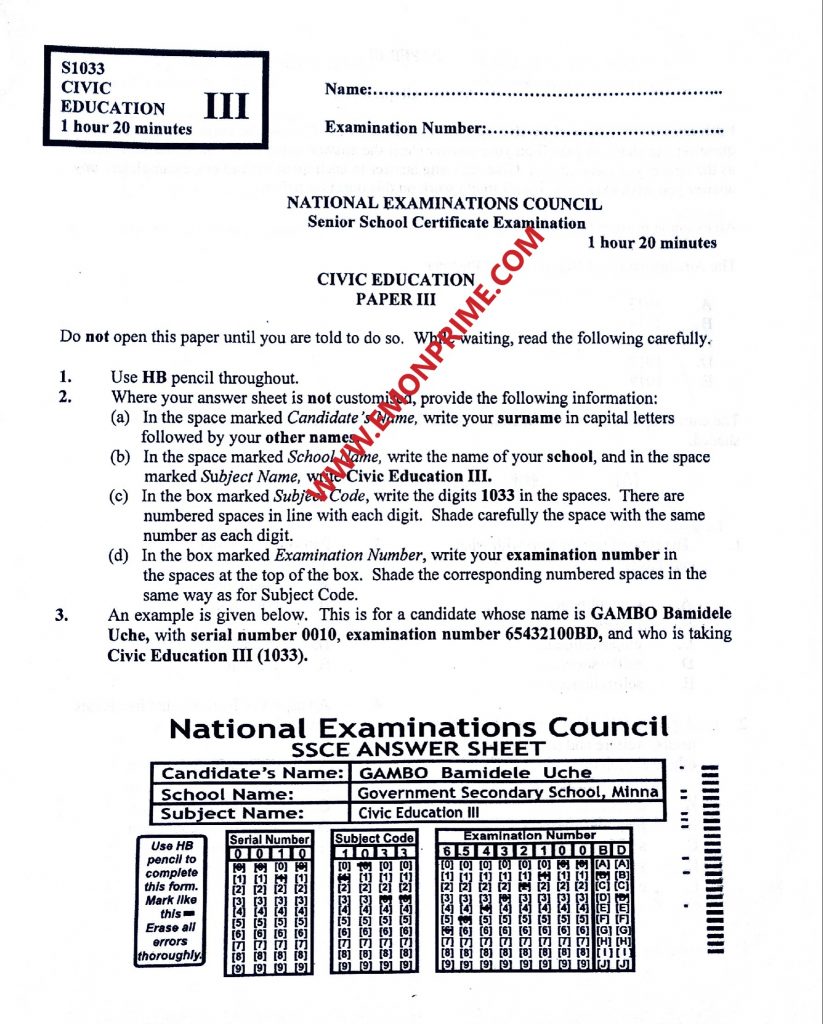
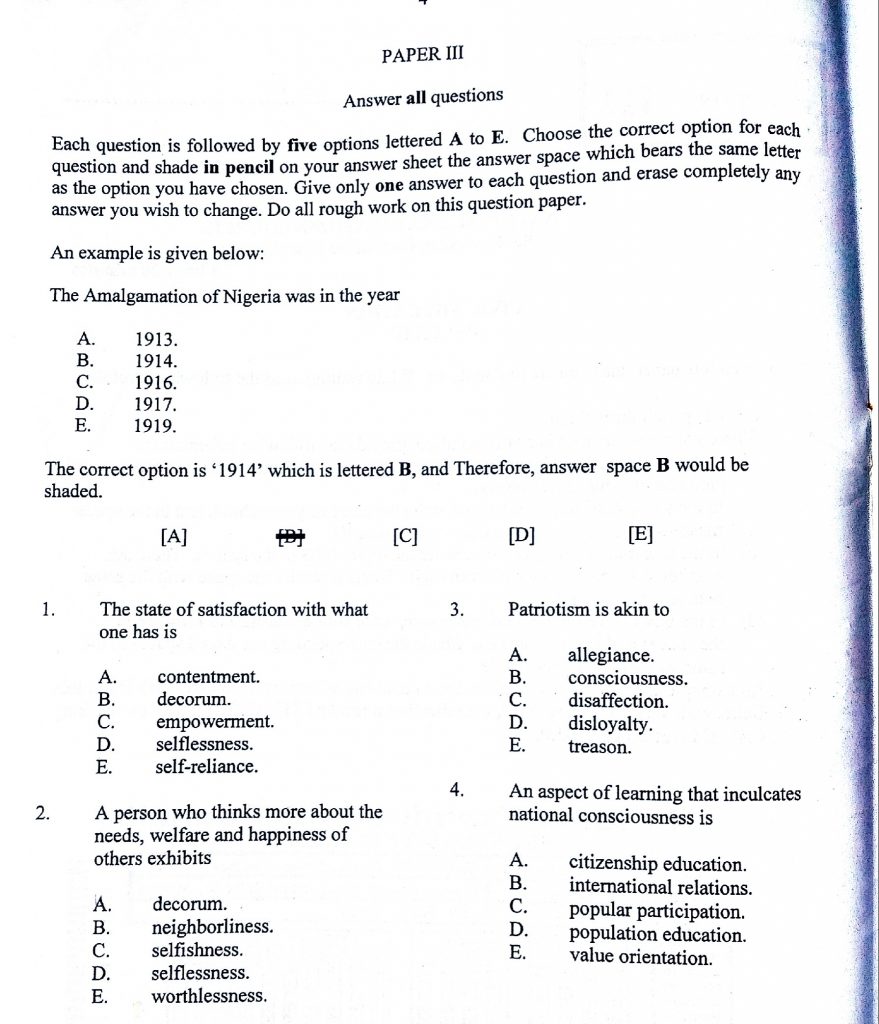
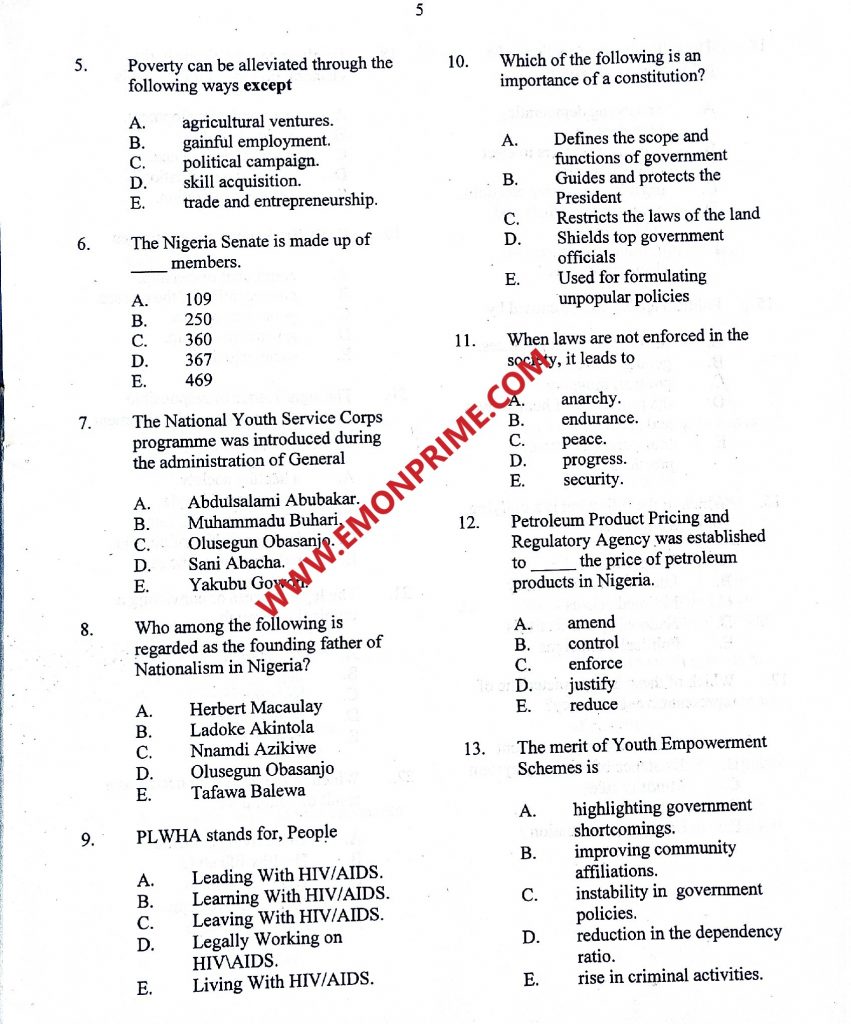
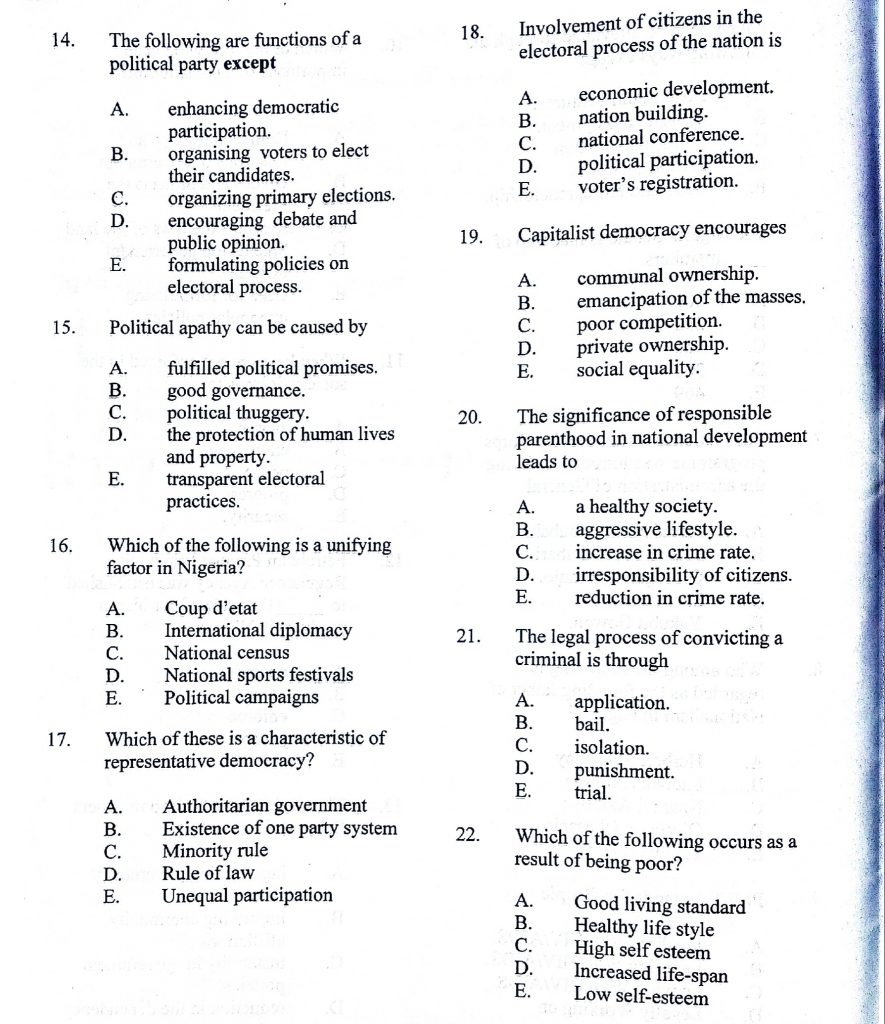
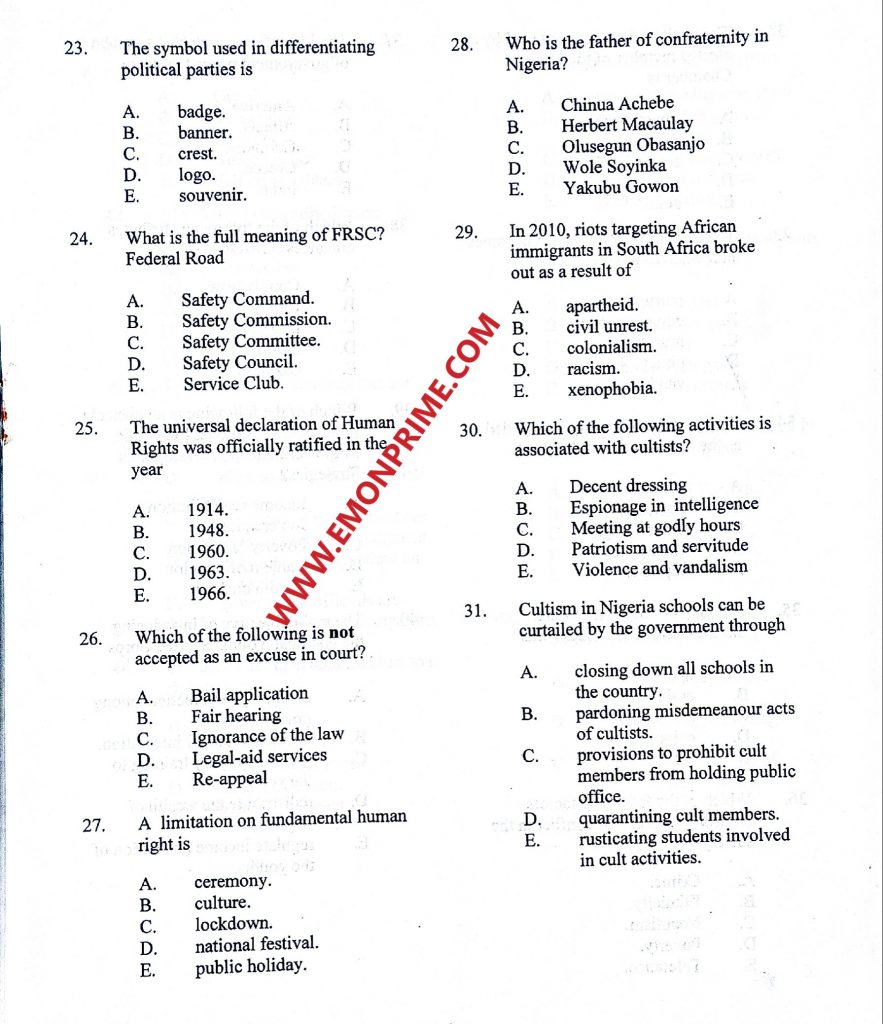
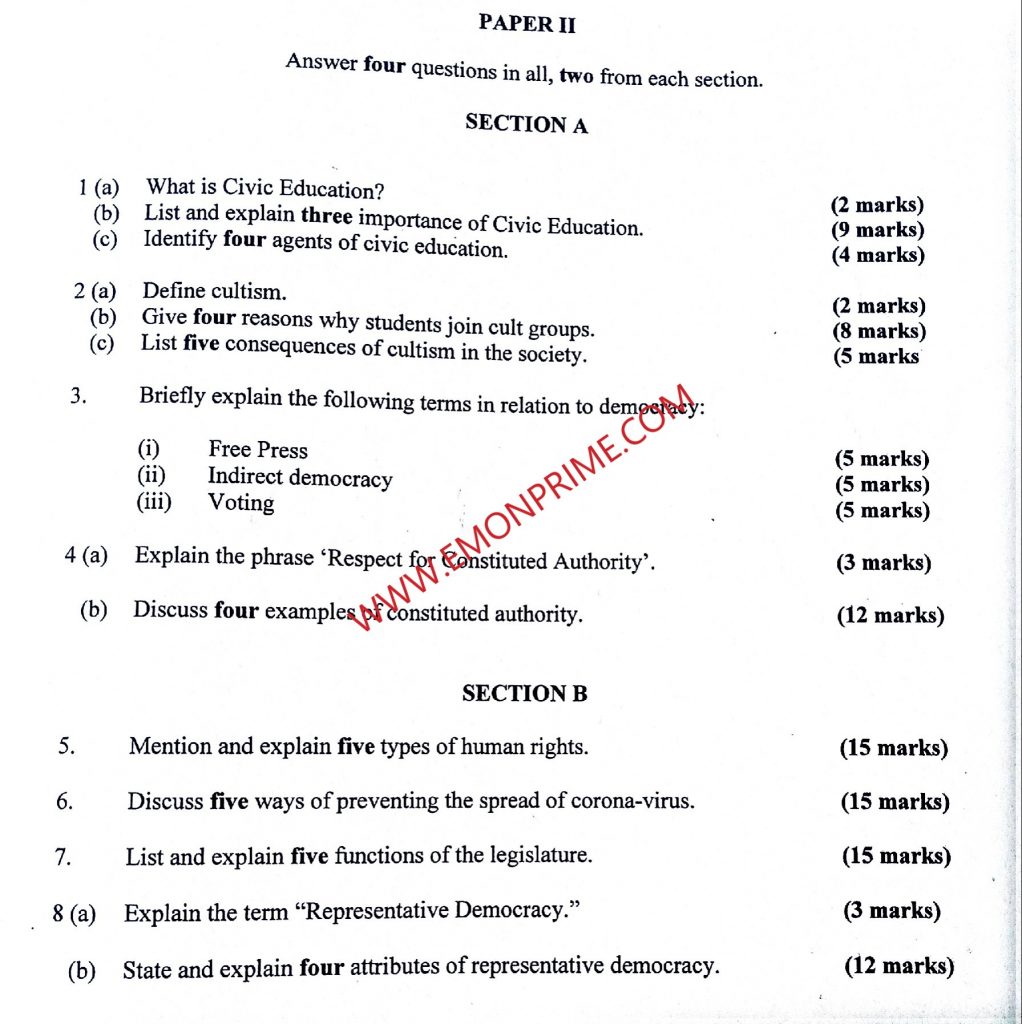
NECO Civic Education Objective Question for 2025
In this section, you are going to be seeing the NECO Civic Education Objective Question for 2025. The following are the kinds of questions that you should expect in your 2025 NECO Civic Education examination.
PAPER III
Answer all questions
Each question is followed by five options lettered A to E. Choose the correct option for each question and shade in pencil on your answer sheet the answer space which bears the same letter as the option you have chosen.
Give only one answer to each question and erase completely any answer you wish to change. Do all rough work on this question paper.
An example is given below:
The Amalgamation of Nigeria was in the year
A. 1913.
B. 1914.
C. 1916.
D. 1917.
E. 1919.
The correct option is ‘1914’ which is lettered B, and Therefore, answer space B would be shaded.
[A] [B] [C] [D] [E]
1. The state of satisfaction with what one has is
A. contentment
B. decorum
C. empowerment
D. selflessness
E. self-reliance
2. A person who thinks more about the needs, welfare and happiness of others exhibits
A. decorum.
B. neighborliness.
C. selfishness.
D. selflessness.
E. worthlessness.
3. Patriotism is akin to
A. allegiance.
B. consciousness.
C. disaffection.
D. disloyalty.
E. treason.
4. An aspect of learning that inculcates national consciousness is
A. citizenship education.
B. international relations.
B. popular participation.
D. population education.
E. value orientation
5. Poverty can be alleviated through the following ways except
A. agricultural ventures.
B. gainful employment.
C. political campaign.
D. skill acquisition.
E. trade and entrepreneurship.
6. The Nigeria Senate is made up of members.
A. 109
B. 250
C. 360
D. 367
E. 469
7. The National Youth Service Corps programme was introduced during the administration of General
A. Abdulsalami Abubakar.
B. Muhammadu Buhari.
C. Olusegun Obasanjo.
D. Sani Abacha.
E. Yakubu Gowon.
8. Who among the following is regarded as the founding father of Nationalism in Nigeria?
A. Herbert Macaulay
B. Ladoke Akintola
C. Nnamdi Azikiwe
D. Olusegun Obasanjo
E. Tafawa Balewa
9. PLWHA stands for, People
A. Leading With HIV/AIDS.
B. Learning With HIV/AIDS.
C. Leaving With HIV/AIDS.
D. Legally Working on HIV AIDS.
E. Living With HIV/AIDS.
10. Which of the following is an importance of a constitution?
A. Defines the scope and functions of government
B. Guides and protects the President
C. Restricts the laws of the land
D. Shields top government officials
E. Used for formulating unpopular policies
11. When laws are not enforced in the society, it leads to
A. anarchy.
B. endurance.
C. peace
D. progress
E. security
12. Petroleum Product Pricing and Regulatory Agency was established to—————-the price of petroleum products in Nigeria.
A. amend
B. enforce
C. control
D. justify
E. reduce
13. The merit of Youth Empowerment Schemes is
A. highlighting government shortcomings
B. improving community affiliations
C. instability in government policies
D. reduction in the dependency ratio
E. rise in criminal activities
14. The following are functions of a political party except
A. enhancing democratic participation.
B. organising voters to elect their candidates.
C. organizing primary elections.
D. encouraging debate and public opinion.
E. formulating policies on electoral process.
15. Political apathy can be caused by
A. fulfilled political promises.
B. good governance.
C. political thuggery.
D. the protection of human lives and property.
E. transparent electoral practices
16. Which of the following is a unifying factor in Nigeria?
A. Coup d’etat
B. International diplomacy
C. National census
D. National sports festivals
E. Political campaigns
17. Which of these is a characteristic of representative democracy?
A. Authoritarian government
B. Existence of one party system
C. Minority rule
D. Rule of law
E. Unequal participation
18. Involvement of citizens in the electoral process of the nation is
A. economic development.
B. nation building.
C. national conference.
D. political participation
E. voter’s registration
19. Capitalist democracy encourages
A. communal ownership
B. emancipation of the masses
C. poor competition
D. private ownership
E. social equality
20. The significance of responsible parenthood in national development leads to
A. a healthy society.
B. aggressive lifestyle.
C. increase in crime rate
D. irresponsibility of citizens
E. reduction in crime rate
21. The legal process of convicting a criminal is through
A. application
B. bail
C. isolation
D. punishment
E. Trial
22. Which of the following occurs as a result of being poor?
A. Good living standard
B. Healthy life style
C. High self esteem
D. Increased life-span
E. Low self-esteem
23. The symbol used in differentiating political parties is
A. badge
B. banner
C. crest
D. logo
E. souvenir
24. What is the full meaning of FRSC? Federal Road
A. Safety Command.
B. Safety Commission
C. Safety Committee.
D. Safety Council
E. Service Club.
25. The universal declaration of Human Rights was officially ratified in the year
A. 1914.
B. 1948.
C. 1960.
D. 1963.
E. 1966.
26. Which of the following is not accepted as an excuse in court?
A. Bail application
B. Fair hearing
C. Ignorance of the law
D. Legal-aid services
E. Re-appeal
27. A limitation on fundamental human right is
A. ceremony
B. culture
C. lockdown
D. national festival
E. public holiday
28. Who is the father of confraternity in Nigeria?
A. Chinua Achebe
B. Herbert Macaulay
C. Olusegun Obasanjo
D. Wole Soyinka
E. Yakubu Gowon
29. In 2010, riots targeting African immigrants in South Africa broke out as a result of
A. apartheid
B. civil unrest colonialism
C. civil unrest
D. racism
E. xenophobia
30. Which of the following activities is associated with cultists?
A. Decent dressing
B. Espionage in intelligence
C. Meeting at godly hours
D. Patriotism and servitude
E. Violence and vandalism
31. Cultism in Nigeria schools can be curtailed by the government through
A. closing down all schools in the country
B. pardoning misdemeanour acts of cultists.
C. provisions to prohibit cult members from holding public office.
D. quarantining cult members.
E. rusticating students involved in cult activities.
32. The territorial area represented by an elected member of the Upper Chamber is
A. constituency
B. district
C. region
D. state
E. zone
33. The right to life of a citizen becomes null when found guilty of
A. corruption
B. ethnocentrism
C. murder
D. piracy
E. vandalism
34. Which of the following is regarded as the highest court in Nigeria?
A. Appeal
B. Customary
C. Federal High
D. Magistrate
E. Supreme
35. A policy in South Africa that disenfranchised the blacks was
A. apartheid
B. assimilation
C. association
D. colonialism.
E. xenophobia.
36. Which of the following factors reduces the spread of conflict in the society?
A. Crime
B. Ethnicity
C. Nepotism
D. Poverty
E. Tolerance
37. The idea of democracy as a system of government originated from
A. America.
B. Athens.
C. Germany.
D. Greece.
E. India.
38. Which of the following attributes enhances self-reliance?
A. Conviviality
B. Creativity
C. Disillusion
D. Indolence
E. Laziness
39. Which of the following is an obstacle to the goal of National Economic Empowerment and Development Strategies?
A. Income redistribution
B. Job creation
C. Poverty alleviation
D. Value reorientation
E. Wealth creation
40. The main objective of introducing the National Youths Service Corps scheme is to
A. discourage interaction among graduates.
B. promote national integration
C. provide military training to the youths
D. redistribute the wealth of Nigeria
E. regulate income generation of the youths
41. Which of the following is an attribute of honesty?
A. Greed
B. Indiscipline
C. Integrity
D. Non-chalance
E. Self-centeredness
42. HIV/AIDS is a deadly disease because it is
A. contactable.
B. curable.
C. incurable
D. infectious
E. normal.
43. The Rule of law connotes that the
A. citizen has no right to fair trial.
B. citizens are equal before the law
C. decisions of government are based on selective judgment.
D. executive be dependent on the judiciary
E. government officials are exempted from obeying laws
44. The act of denying an individual the right to vote is
A. denial
B. discrimination.
C. disenfranchisement.
D. disqualification.
E. enfranchisement.
45. Nigerian youths are empowered through the following except
A. access to quality education
B. involvement in political thuggery
C. provision of employment.
D. provision of soft loan
E. skill acquisition
46. Which of the following is a symptom of HIV/AIDS?
A. Prolific sneezing
B. Prolonged dry cough
C. Radiant skin
D. Rapid weight gain
E. Strong muscle mass
47. The power to prosecute a criminal in Nigeria, is vested with the
A. Correctional Service.
B. Court Clerk
C. Court
D. Police.
E. Prison
See also: NECO Government Questions and Answers for 2025
48. What are the merits of a constitutional democracy? It
A. defines an illegitimate government.
B. delays decision making processes.
C. improves the quality of government policies.
D. lacks accountability.
E. leads to instability of government.
49. Which of the following is contrary to selfless behaviour?
A. Contributing to neighbourhood security
B. Participating in communal projects
C. Participating in cultural festivities
D. Responding to national call
E. Vandalising government property
50. HIV/AIDS can be prevented through
A. personal decision to abstain from casual sex
B. sharing unsterilized sharp objects
C. unfaithfulness to partner
D. unprotected sexual intercourse
E. wearing a face mask
51. Direct democracy is the system of government in which citizens
A. choose their representatives through elections.
B. collude with political leaders to foster violence..
C. debate with their rivals in open public meetings
D. are not involved in making policies
E. represent themselves in decision-making process.
52. The virtue that promotes unbiased and non-discriminatory attitude is
A. cooperation.
B. injustice
C. integrity.
D. jurisprudence.
E. selflessness.
53. The laws of Nigeria are enshrined in the
A. constitution
B. court of law.
C. edict
D. penal code
E. sharia law
54. The seat of power officially moved to Abuja on 12th December,
A. 1989
B. 1990
C. 1991
D. 1992.
E. 1993.
55. Which among the under listed is not a component of the Armed Forces? Nigeria
A. Air Force.
B. Army.
C. Civil Defence Corps.
D. Military Police.
E. Navy
56. A system where vital means of production is owned and controlled by the government is
A. capitalism
B. dictatorship.
C. feudalism.
D. socialism.
E. theocracy.
57. Which of the following behaviours depicts selfishness?
A. Encouraging the spirit of patriotism
B. Glorifying others
C. Love for the society
D. Seeking for personal satisfaction
E. Sharing one’s possessions with others
58. Which of the following Nigeria currency notes bear pictorial
representation of the major ethnic groups?
.A. N10
B. N20
C. N50
D. N100
E. N200
59. The Laws enacted by the military are called
A. bills
B. bye-laws
C. constitution.
D. decrees.
E. edicts.
60. The arm of government responsible for making laws in Nigeria is the
A. executive
B. judiciary
C. legislature
D. police
E. public service
See the answers in the next section
NECO Civic Education Objective Answers for 2025
The following are the complete answers to the objective questions that I have given you in the previous section:
.1. A
2. D
3. A
4. E
5. C
6. A
7. E
8. A
9. E
10. A
11. A
12. B
13. B
NECO Civic Education Theory Questions for 2025
PAPER II
Answer four questions in all, two from each section.
SECTION A
1 (a) What is Civic Education? (2 marks)
(b) List and explain three importance of Civic Education. (9 marks)
(c) Identify four agents of civic education (4 marks)
2. (a) Define cultism. (2 marks)
(b) Give four reasons why students join cult groups. (8 marks)
(c) List five consequences of cultism in the society. (5 marks
3. Briefly explain the following terms in relation to democracy:
(i) Free Press (5 marks)
(ii) Indirect democracy (5 marks)
(iii) Voting (5 marks)
4 (a) Explain the phrase ‘Respect for Constituted Authority’.
(3 marks)
(b) Discuss four examples of constituted authority.
(12 marks)
SECTION B
5. Mention and explain five types of human rights. (15 marks)
6. Discuss five ways of preventing the spread of corona-virus.
(15 marks)
7. List and explain five functions of the legislature.
(15 marks)
8 (a) Explain the term “Representative Democracy.”
(3 marks)
(b) State and explain four attributes of representative democracy.
(12 marks)
NECO Civic Education Theory Answers for 2025
Pay attention as I am going to give the complete answers to the theory questions that you saw in the previous section. I know that you would be very anxious to see those answers that I want to show you. make sure that you do not leave this page for any reason.
The following are the answers to the NECO Civic Education Theory answers for 2025 June/July examination:
1 (a)
Meaning of Civic Education
Civic education can be defined as the study of all the processes that affect people’s beliefs, commitments, capabilities, and actions as members or prospective members of communities.
Civic education need may not be intentional or deliberate; institutions and communities pass values and norms without meaning to. It may not be beneficial: sometimes people are civically educated in ways that disempower them or impart harmful values and goals.
It is certainly not limited to schooling and the education of children and youth. Families, governments, religions, and mass media are just some of the institutions involved in civic education, understood as a lifelong process.
1 (b)
Importance of Civic Education
1. positive transformation of the society
The rally call of all political parties in our nation is woven around various proposals to bring change in our society. But the real issue is not in leadership but in the value each citizen brings to the nation.
By instilling in every citizen, the values of leadership and responsibility irrespective of status and age, our nation can be transformed by our individual and collective good actions.
2. Peace and Equality
Civic education teaches us to respect each other’s belief and see each other as brothers or equal. One sad reoccurrence in our society today is ethnicity and religious superiority.
The belief that one’s ethnic group or tribe or religion is better than others. It has brought about nepotism, injustice, inequality, war and bloodshed in our Nation.
Citizens need to be enlightened through civic education and learn to accept everyone irrespective of language, tribe or belief.
3. Patriotism
Through Civic education, we as citizens begin to feel love, devotion and attachment to our country. Obeying the laws of the land, promoting good values, shunning vices and active participation in the governance of the nation.
There’s also an alliance with one another as we share a common goal of making our nation better rather than indulging in unscrupulous acts that hinder national growth.
4. Sustainable Development
The curriculum of Civic education is structured to address the goals of sustainable development which are summed up into social justice, ecological sustainability, good governance and economic productivity.
Sustainable development is one which builds on developing the society today with the future in mind. Civic education buttresses on arming citizens with current trends in this age like ICT skills as we approach the 4th industrial revolution era, as well as conflict resolution strategies, solutions in health, social, economic and political problems.
It challenges individuals not only to point out threats in our present and future but also to provide solutions to these problems, thereby sustaining growth in our nation and in the world at large.
1 (c)
Agents of Civic Education
(i) School
(ii) Peer-group
(iii) Mass media
(iv) Religions institutions
(v) Community
2 (a)
Meaning of Cultism
Cultism is the ritual practice by a group of people whose membership, initiation, policies and activities are carried out in the secret. It is the major social problem of the society in Nigeria.
Four reasons why student join cult group
- For protection
- The desire for brotherhood
- Ignorance
- Pride
- Frustration
- Attacks from members
- Low self esteem
2 (c)
Consequences of Cultism
(i) Breakdown of law and order.
(ii) Violence and social instability.
(iii) Disruption of academic activities.
(iv) Disorientation of societal values.
(v) Premature death of youths who are cult members/innocent victims.
(vi) Drug addiction and related health problems
SECTION B
5. (5)
(i) Right to life.
(ii) Right to freedom of expression.
(iii) Right to fair and equal hearing.
(iv) Right to freedom of movement.
(v) Right to own property.
Let’s explain them one by one:
(i) Right to life: This right you to live or to exist. Nobody has the right to kill another person or himself or herself.
(ii) Right to freedom of expression: Under this right, everyone is free to hold opinions, express same or receive or impart ideas and information without interference. This is the right to say whatever one wants to say. The press I.e Newspapers e.t.c. have the right to say or report any news without being harassed or forced not to do so.
(iii) Right to fair and equal hearing: Every Citizen has the right to be listened to before they are punished. Even it a thief is caught stealing the court has to listen to his or her defence before dispensing judgment.
(iv) Right to freedom of movement: Every citizen of Nigeria is free to move from one part to the other and to reside in any part of the country. No citizen of Nigeria must be denied entry into and movement out of Nigeria.
(v) Right to own property: Every person is entitled to own private property and no movable or immovable property or the interest from it can be compulsory acquired in any part of Nigeria.
6)
Ways to prevent the spread of Corona-virus
As the COVID-19 pandemic continues, we’re told we can each play a role in preventing its spread. But how? In this video, Clara Liao, a Yale School of Medicine PhD student, sketches out the most important precautions to take on your next grocery store run or other necessary errand.
“There is a lot of information out there about how we should be protecting ourselves and others from COVID-19,” Liao says.
Though headlines have sometimes sent conflicting messages, health researchers agree that protective measures currently in place, such as stay-at-home orders, as well as the five key practices described below, will continue to help “flatten the curve.” (This term, which Liao describes in another illustrated summary, refers to the need to slow the spread of COVID-19 so that U.S. health care system’s staff and resources aren’t pushed beyond capacity to care for hospitalized coronavirus patients.)
So far, the best actions to take to slow the transmission of COVID-19 include:
Social distancing (maintain a distance of 6 feet between yourself and others)
Stay at least 1 metre away from others, even if they do not appear to be sick, since people can have the virus without having symptoms. Avoid large gatherings, public spaces and public transportation. Avoid social touching, this includes shaking hands, kissing or hugging, instead try a hand wave or a smile.
Stay at home
You should avoid moving from one location to another as the Corona-Virus is still prevalent. It is advisable that you stay in your home instead of visit others or going to social gathering.
This will help in a great way to curb the spread of corona-virus from one person to another. For instance, you cannot get contacted with corona-virus if your neighbor, friend, playmate, church member, co-worker has it if you strictly maintain the rule of staying at home at all times.
Avoid touching your face
Touching of surfaces, especially in public settings or health facilities should be avoided, in case people infected with COVID-19 have touched them. Clean surfaces regularly with standard disinfectants.
Wash your hands frequently with soap for 20 seconds each time
It may be the most frequently repeated advice for avoiding illness—especially during the coronavirus pandemic—and it’s a simple one: Wash your hands.
“Among the many infection prevention practices available to doctors, good handwashing has made the single biggest impact on infection transmission and resulted in savings millions of lives,” says Arjun Venkatesh, MD, MBA, MHS, a Yale Medicine emergency medicine specialist.
Good handwashing with the help of soap and the friction of rubbing hands together is a strategy that can minimize germs, or pathogens that cause disease.
One new analysis even suggests we could dramatically decrease coronavirus infections by increasing traveler engagement with hand hygiene at certain highly traveled airports.
“The most common mistake made when it comes to handwashing is forgetting to do it in the first place; the second most common mistake is doing it so fast that you don’t get every part of both hands,” says Dr. Venkatesh. Here are handwashing tips from the Centers for Disease Control and Prevention (CDC) and Yale doctors whose work depends on good hand hygiene.
- Use clean, running water to wet your hands. The water can be cold or warm—cold water actually does work and warm water is more likely to irritate skin.
- Rub your hands with soap (and rub your hands together to lather the soap).
- Lather both the front and back of your hands, in between all of your fingers, under the fingernails, thumbs, and up to the wrist.
- Wash your hands for at least 20 seconds—about as much time as it would take to sing the Happy Birthday song twice from start to finish. (But keep in mind that a thorough cleaning—the friction, how intensely you rub your hands together—is more important than time spent washing hands.)
- Dry your hands completely. You can dry them under a warm air dryer, or use a paper towel. Avoid a recently used towel as moisture is a good breeding ground for bacteria, which makes drying your hands an important step.
Once your hands are clean, avoid touching surfaces such as the sink and faucet, door handles, your phone, or other objects where you can potentially pick up new germs.
A good strategy after using the bathroom, for instance, is to push the door open with your elbow if you can or use the same paper towel with which you dried your hands to grasp the door handle and open it. Then, throw the towel in the trash.
According to the CDC, you should wash your hands before and after preparing and eating meals, when caring for another person who is sick, after using the bathroom, after coughing or sneezing, after changing a diaper, before and after treating a cut or wound, after touching an animal or anything animal-related (including pet food and pet treats), or any time your hands are dirty.
Wear a cloth mask
There are four key things you should know about the CDC’s face mask recommendations:
- A mask can be made from simple materials. It can be a basic covering that you make yourself using materials you find around the house even a T-shirt. The CDC does not recommend using surgical masks or N95 respirators (devices worn to block airborne particles). These are critical supplies needed by health care workers who may be at high risk for exposure to COVID-19 infection.
- A mask is meant to protect others, not yourself. Whether or not you are feeling sick or have COVID-19 symptoms, there is evidence that if you have the virus, you may be able to transmit it to others when you speak, cough, or sneeze.
- The mask recommendation is not for everyone. The advice doesn’t apply to children younger than 2, people who have trouble breathing, or anyone who is unconscious, incapacitated, or otherwise unable to remove the mask without assistance.
- Do not abandon other preventive measures. The president’s Coronavirus Guidelines for America, 30 Days to Slow the Spread remains the cornerstone of the national effort to slow the spread of the novel coronavirus. These guidelines also urge Americans to work or study from home if they can, avoid gatherings of more than 10 people, and practice good hygiene that includes hand washing and not touching your face.
The CDC’s advice was a turnaround from previous recommendations which said that the only people who needed masks (other than health care workers) were those who were sick or caring for someone who was ill and unable to wear one. It says its new recommendation is based on recent studies that show that a significant number of people with the novel coronavirus who don’t have symptoms can still transmit the virus to others.
Like the common cold and influenza viruses, SARS-CoV-2, the virus that causes COVID-19, travels through the air in respiratory droplets propelled by an infected person’s sneeze or cough.
“Research now suggests that droplets may even be emitted from just speaking or breathing and can potentially last in the air for three hours before falling to the ground,” Liao says, pointing out a worrying characteristic of the virus’ ability to spread easily between people.
More answers are loading… keep reading!
More Practice Questions On NECO Civic Education
To equip you very well as prepare for the NECO examination in Civic Education, it is also important to give you more of these practice questions on NECO Civic Education.
This is to get you more prepared for the kind of questions that you are going to face during the examination. If you must study hard to pass this examination, then you have to take information very serious.
.1. Inter communal relationship exists between
.A. towns
B. relatives
C. friends
D. couples.
E. colleagues.
2. Which of the following values connotes deviant behaviour in the society?
A. Justice
B. Honesty
C. Diligence
D. Desperation
E. Contentment
3. Which of the following is not an attribute of honesty?
A. Uprightness
B. Truthfulness
C. Reliability
D. Covetousness
E. Contentment
4. Maintenance of law and order in the society can be hindered by
A. queuing culture
B. punctuality
C. obedience
D. desperation
E. decorum
5. An authority derived from the constitution of a country is
A. traditional.
B. legal.
C. delegated
D. coercive.
E. Charismatic
6. The agency charged with the responsibility of keeping roads and
highways safe for movement is
.A. Vehicle Inspection Officer.
B. Traffic Warden.
C. Nigeria Police.
D. Nigeria Custom Service.
E. Federal Road Safety Commission.
7. The highway code designed to enhance pedestrians free movement is
A. zebra crossing
B. T-junction
C. roundabout
D. road diversion
E. road blocks.
8. When a person gives up his luxury for the sake of others, it is
A. unity
B. selflessness
C. fairness
D. cooperation.
E. commitment.
9. Payment of taxes by citizens to the government is regarded as
A. generosity
B. duty
C. donation
D. contribution
E. charity
10. The discrimination against people living with HIV/AIDS defines
A. stigmatization.
B. separation.
C. rejection
D. quarantine
E. isolation
11. The quality of being fair and impartial signifies
A. organization
B. orderliness
C. equity
D. equality.
E. efficiency.
12. Maintaining relationship with other countries is the responsibility of the
A. Legislature
B. Judiciary.
C. Interpol
D. Executive
E. Citizens.
13. The act of conducting oneself in a proper and acceptable manner is
A. socialization
B. patience
C. humility
D. decorum
Attitude
14. The rights of citizens are spelt out in the
A. penal code
B. hansard
C. constitution
D. code of conduct
E. bye-law
15. Citizens are expected to maintain law and order in other to avoid
A. stability
B. orderliness
C. oppression
D. compromise
E. chaos
16. Which of the following items does federal government has the power to legislate on?
A. Motor park
B. Market
C. Local government
D. Immigration
E. Chieftaincy affairs
17. The fight against HIV/AIDS in Nigeria was initiated during the administration of
A. Umaru Yar’Adua.
B. Sani Abacha.
C. Olusegun Obasanjo.
D. Muhammadu Buhari
E. Goodluck Jonathan.
18. The ability to handle tools with appropriate control to accomplish a task is ———— skill.
A. manipulative
B. listening
C. life-coping
D. intellectual
E. communicative
19. The penalty for those involved in child trafficking in Nigeria is ———– years jail term.
A. 14
B. 13
C. 12
D. 11
E. 10
20. A representative democracy is characterized by
A. vote buying
B. political apathy
C. periodic election
D. god fatherism
E. ballot box snatching.
21. Democracy originated from
A. Greece.
B. Germany
C. France
D. Britain
E. America.
22. “The minority have a say while the majority have their way” is a slogan in ———— government.
A. theocratic
B. monarchical
C. democratic
D. autocratic
E. aristocratic
23. Which of the following can be a reason for drug abuse?
A. Wealth
B. Relevance
C. Fulfillment
D. Curiosity
E. Contentment
24. NAFDAC headquarters is located in
A. Lagos.
B. Kaduna.
C. Enugu
D. Calabar
E. Abuja
25. Which of the following functions is performed by NDLEA?
A. Marketing
B. Manufacturing
C. Exportation
D. Elimination
E. Distribution
26. Popular participation can be encouraged through
A. press censorship
B. political parties
C. political awareness
D. judicial process
E. electoral promises
27. Citizens’ participation in communal projects is an indication of
A. uprightness
B. solidarity
C. satisfaction
D. endurance
E. co-operation
28. Drug abuse can be prevented by
A. self-medication
B. sanction
C. public enlightenment
D. patronage of quacks
E. condemnation.
29. The main use of drugs is for
A. sporting
B. pleasure
C. healing
D. energy
E. dieting
30. The body of laws that regulate the activities of people in the country is
A. minute
B. manifesto
C. hansard
D. document
constitution.
31. The process that qualifies an electorate to vote during election is
A. sponsorship
B. registration
C. propaganda
D. observation
E. campaign
32. The importance of inter communal relationship is
A. violence
B. suspicion
C. dialogue
D. development
E. conflicts
33. Which of the following is not a reason for the shortcoming in public service?
A. Jumbo remuneration
B. Indiscipline
C. Corruption
D. Consistency of government policies
E. Colonial influence
34. The agency saddled with the responsibility of educating people on government policies is
A. Standard Organisation of Nigeria
B. Nigeria Labour Congress.
C. National Union of Teachers.
D. National Orientation Agency
E. Civil Liberty Organisation
35. Voting in an election is a sign of ——- participation.
A. social
B. religious
C. popular
D. political
E. economic
36. The following are qualities of civil society except they
A. resist dictatorship
B. promote peace
C. encourage corruption
D. are transparent
E. are good mobilizers
37. The consequence of disorderliness is
A. Respect
B. Resourcefulness
C. decorum
D. consistency
E. chaos
38. When a citizen displays lack of enthusiasms in political issues, it is political
A. socialization
B. reasoning
C. protest
D. instability
E. apathy
39. A peculiar symbol of authority to Nigeria National Assembly is the
A. wig
B. mace
C. gavel
D. flag
E. baton
40. A system of government where power resides with the people is
A. theocracy
B. oligarchy
C. monarchy
D. democracy
E. aristocracy
41. The current Nigerian Senate president is
A. Ken Nnamani.
B. David Mark.
C. Bukola Saraki.
D. Anyim Pius Anyim.
E. Ahmed Lawan.
42. Nigeria became a republic in
A. 1973.
B. 1970.
C. 1965.
D. 1963.
E. 1960.
43. The Senate of Nigeria is also known as the
A. upper house
B. national assembly
C. lower house
D. legislative chamber
E. law chamber
44. Who defines democracy as “the government of the people, by the people and for the people”?
A. Richard Nixon
B. Jimmy Carter
C. Gerald Ford
D. George W. Bush
E. Abraham Lincoln
45. Democracy is classified into ——— types.
A. 6
B. 5
C. 4
D. 3
E. 2
46. The worst consequence of cultism in the society is fear.
A. fear
B. failure
C. expulsion
D. desperation
E. death
47. The main motive behind the formation of pyrate confraternity was to check all forms of ———— against students.
A. violence
B. lust
C. extortion
D. ethnicity
E. discrimination
48. The bicameral legislature comprise of ——– chamber(s).
A. 5
B. 4
C. 3
D. 2
E. 1
49. Which of the following acts of government does not promote poverty alleviation?
A. Protect the vulnerable group in the society
B. Invest in basic social services and infrastructure
C. Government must guarantee freedom of life
D. Government must ensure macro economic stability
E. Disregard for the rule of law
50. In a democracy, political leaders come to power through
A. selection
B. heredity
C. election
D. competition
E. appointment
51. The current name of the institution responsible for conducting federal and state elections in Nigeria is
A. SIEC
B. NECON
C. NEC
D. INEC
E. FEDECO
52. Nationalism emphasizes the ideology of
A. protest
B. opposition
C. loyalty
D. domination
E. discrimination
53. Which of the following encourages drug abuse?
A. There should be disciplinary measures
B. Parents should monitor and detect early signs of substance abuse
C. Parents and guardians should overlook the activities of their wards
D. Government should enact laws on the use of drugs
E. Associating with good friends
54. The first confraternity in Nigeria’s institutions was formed in
A. 1955
B. 1954
C. 1953.
D. 1952.
E. 1951.
55. Which of the following can guarantee wealth creation?
A. Unemployment
B. Low endowment of human capital
C. Lack of political participation
D. Economic development
E. Corruption
56. Courtship is an example of ———– relationship
A. religious
B. racial
C. personal
D. ethnic
E. communal
57. A desirable attribute for inter personal relationship is
A. patience
B. greed
C. desperation
D. contest
E. competition.
58. To ensure desirable communal relationship, people should —- each other.
A. tolerate
B. suspect
C. gossip
D. condemn
E. castigate
59. The most acceptable form of resolving inter communal conflicts is by
A. mediation
B. litigation
C. interrogation
D. contention
E. arguments
60. Self reliance can be beneficial to the society in the area of
A. resolution
B. generosity
C. employment
D. dependency
E. competition
Related Links:
Complete WAEC Mathematics Questions and Answers
Complete WAEC Physics Questions And Answers For 2025 (Objectives And Theory)
Complete WAEC Biology Questions And Answers For 2025 | Theory And Objectives
2025 JAMB Physics Questions for the Day One | CBT Questions & Answers
2025 WAEC Biology Practical Specimen, Questions and Answers
Now let’s go to the answers…
More Theory NECO Civic Education Questions
PAPER II
Instruction
Answer two questions from each section. Each question carries equal marks.
SECTION A
1(a). What is the full meaning of UDHR? (3marks)
(b). Discuss three roles of government in UDHR. (12marks)
2. Explain five advantages of National Integration.
(15marks)
3(a). Define Representative Democracy. (3marks)
(b). Explain four activities of a political party. (12marks)
4(a). State three fundamental rights of a citizen. (3marks)
(b). Discuss four political rights of a citizen. (12marks)
SECTION B
5(a). Define Rule of Law. (3marks)
(b). Enumerate and explain four advantages of Rule of Law.
(12marks)
6(a). What is popular participation in politics? (3marks)
(b). Discuss four ways through which popular participation in politics can be encouraged.
(12marks)
7(a). Mention three traffic signs. (3marks)
(b). Explain four causes of road accident. (12marks)
8(a). What is value? (3marks)
(b). Discuss any four of the following values (12marks)
i. Discipline
ii. Contentment
iii. Hardwork
iv. Tolerance
V. Integrity
vi. Honesty
(12marks)
Answers
1 (a)
UDHR means Universal Declaration of Human Rights
1 (b)
Roles of Government in UDHR:
Conduct investigation into cases of Human Right violation: the government is saddled with the obligation of venturing into unbiased investigations on any case of allegation of human right infringement.
Government can take all the necessary measures to protect human right defenders against violence, discrimination, and retaliation as they embark on their roles.
Establishment of Agencies NAPTIP, Legal Aid Council: these agencies will ensure that fundamental human rights are defended. Government can ensure this by punishing any offender of human right.
More answers are coming…
How to make “A” in NECO Civic Education Examination
The goal of every candidate of the National Examination Council (NECO) is to write the examination and come out with a flying colour. That is the reason why this section is important to everyone.
Here, I am going to show you the things that you are expected to do if you must have an excellent result (score As) at the end of this examination.
If really want to make an “A” in the NECO Civic Education examination, you have to do the following:
.1. Cover your Syllabus
As a student who is expecting an “A” from any examination, you do not have to relent your efforts in trying to read up everything that you are expected to read before the examination date.
This is where most candidates get it wrong. The syllabus was given to you to serve as a compass to where the examination questions are definitely going to come out from. Therefore, it is necessary that as prepare for the examination, you should not leave any stone unturned.
2. Read instructions
When you get to the examination hall and the question paper and answers booklet have been issued to you, what you must do is to start by going through the instruction given. That is, reading all the guidelines as provided in the papers by the examiners.
Here, you do not have to assume that you know it all. Ensure that you read the instructions and follow them strictly.
3. Finish your Questions
Going according to the instructions, you are expected to answer the recommended number of questions completely and ensure that the answers booklet that you are going to submit does not contain any incompletely answered question(s).
Get more tips: How to Pass your NECO Examination at One Sitting
With the above tips, you are surely going to have an excellent result at the end of the examination.
I believe that you have enjoined reading this article. If you have any other questions about the NECO Civic Education Questions and Answers for 2025, kindly make use of the comment sections below this article.
I wish you the best!
Do not forget to share this information with others.
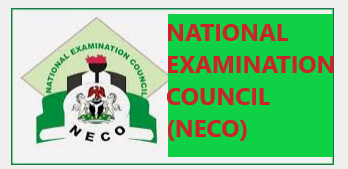
Great insights in this post! The breakdown of the theories and objectives really helps clarify the important concepts for NECO Civic Education. Looking forward to more updates and practice questions!